
The construction of a dam as large as the Grand Ethiopian Renaissance Dam without coordinating with the High Dam in Aswan is ‘unprecedented’, Egypt’s Minister of Irrigation Mohamed Abdel Aati said, adding that it requires the existence of a clear and binding coordination mechanism between the two dams that Ethiopia has rejected.
Egypt offered Ethiopia many scenarios that guarantee the dam’s ability to generate electricity by up to 85 percent in the most extreme cases of drought, he said, stressing the need for a coordinating mechanism under a fair and binding legal agreement that would be among measures to adapt to the negative effects of climate change.
In his speech on the sidelines of the World Youth Forum, Abdel Aati added that Egypt agreed to establish many dams in the Nile Basin countries, such as the Owen reservoir in Uganda which Egypt financed in addition to many dams in Ethiopia, such as the Tekezé Dam, Chara Chara and Tana Beles dams – none of which Egypt objected to.
He referred to the project of the navigation corridor between Lake Victoria and the Mediterranean, which aims to transform the Nile into a development hub linking the Nile Basin countries. The project includes a navigation corridor, a road, a railway, electrical linkage and an internet cable connection to achieve comprehensive development of the Nile Basin countries.
According to Abdel Aaty, the project achieves regional integration and brings together the basin countries, as river transport between countries is one of the best means capable of transferring trade in various types and sizes at low cost, lower energy consumption, and higher safety rates compared to other means.
Abdel Aati further stressed the project’s role in supporting the movement of trade and tourism between the participating countries and with other countries of the world, working to provide job opportunities, increasing the ability of landlocked countries to connect to the seas and global ports, while supporting economic development.
It also strengthens the region’s position in the global economic system as well as support cooperation and integration between African countries in all fields, as reflected in the project’s motto: “One Continent – One River – A Common Future”.
Abdel Aati stressed that the cooperation between Egypt and African countries is one of the prominent signs of distinguished ties built on the foundations of friendship and the exchange of experience.
He stressed Egypt’s support for development in the Nile Basin countries and African countries through many projects, saying Egypt has established many rainwater harvesting dams, and underground drinking water plants using solar energy, and implemented projects to purify waterways, protect against the dangers of floods, establish many fish farms and river marinas.
The Irrigation Ministry has also contributed to preparing studies for projects to construct multi-purpose dams to provide electricity and drinking water for citizens in African countries, Abdel Aati stated.




